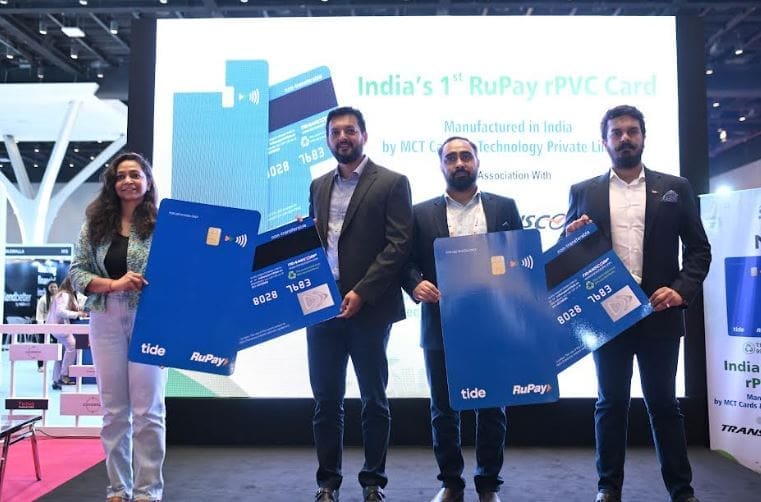Tide, the UKs leading SME-focused business financial platform in partnership with Transcorp International Limited, a Reserve Bank of India (RBI) regulated Prepaid Payment Instrument (PPI) license holder, today announced the launch of Indias first recycled (rPVC[1]) Rupay card, along with MCT Cards & Technology Pvt. Ltd. and NPCI (National Payments Corporation of India).
Tide and Transcorp launch Indias first-ever recycled PVC card in association with NPCI, manufactured indigenously by MCT Cards and Technology Pvt. Ltd.
The move reinforces Tide’s commitment to becoming a more sustainable company, including its pledge to make reaching Net Zero simpler for its members (customers) in India, and globally. Made from 99% recycled plastic, this is the first such move by a fintech company in India. Each rPVC card will save 7g of carbon and save 3.18g of plastic, which would ordinarily be used in the production of a new card made with virgin PVC.
The cards will go through an open loop recycling process, which means that old products are transformed into new ones, reducing industrial plastic waste. The material used for production of Tide rPVC cards is approved by global testing agencies including market leader Intertek, and is also compliant with GRS 4.0 (Global recycled standard). All the cards are tested for parameters like Ink Adhesion/Wrappage/Bending/Stress Test and are compliant with ISO standards, they also undergo a CIPET[2] certification. The cards will carry the sustainability badge on the reverse side, educating the customer that the card is made of recycled plastic.
In March, Tide became the first fintech in the world to remove 100% of its emissions with durable carbon removals as of 2022 onwards. The business has also committed to becoming fully NetZero by 2030 and to support its UK members (more than 9% of UK SMEs), and growing network of Indian SMEs on their journey to NetZero.
To deal with the devastating impacts of climate change, Tide made three pledges:
Pledge 1: Tide Removal NetZero – Tide commits to removing 100% of our emissions with durable carbon removal from 2022 onwards.
Pledge 2: Tide Reduction NetZero – Tide will reduce 90% of our 2021 emissions per employee by 2030. In doing so, we will reduce emissions by 97% on a revenue basis. Pledges 1 and 2 will make Tide fully Net Zero by 2030.
Pledge 3: Tide Member NetZero – Tide commits to making Net Zero simpler for our Members by developing support for them to get to NetZero.
Tide and Transcorp, along with MCT and NPCI will embark on this industry-first initiative as part of an India-wide and global shift away from virgin plastic and accelerating commitments towards reducing carbon emissions.
Gurjodhpal Singh, CEO, Tide (India) said, “At Tide, we believe that businesses need to take action now on climate change. With our industry-first move, we are taking further action to curtail the spiralling effects of greenhouse gases on the Earth’s atmosphere. Tide’s third of three NetZero pledges committed to helping our 550,000 members worldwide kickstart their own journey to NetZero by introducing products, features and content to help them. The rPVC card is one such initiative. Tide is committed to ensuring our members in India benefit from the launch of this new card.”
Ayan Agarwal, CEO, Payment Systems, Transcorp International Ltd., said, “Transcorp remains committed to implement the goals of not only our partners, but also to bolster the vision of the Government (COP26 Summit at Glasgow) and Reserve Bank of India (Report on Climate Risk & Sustainable Finance) of achieving net zero emissions in India. Continuing the streak of first in market innovations – Transcorp has once again aligned stakeholders from across the industry to launch recycled plastic cards in record time! In our mission to build compliant and curated products with our fintech partners, we are pleased to also contribute towards an ecological economy.”
Girish Kini, CEO & SBU Head – Cards & Secure Solutions, MCT Cards and Technology Pvt. Ltd., said, “As one of India’s largest card manufacturing bureau, we at MCT cards & technology recognise the critical role we play in promoting sustainable practices and protecting the environment. There is a lot of interest in environment friendly cards & we are proud to offer our clients a range of eco-friendly cards that offer several benefits and make a positive impact on the environment.”
rPVC cards are very similar to standard PVC cards in how they look. The rPVC is made by recycling PVC waste, reducing the amount of landfill contributed by a standard PVC card which does not decompose. These cards are made from recycling consumer/industrial PVC waste and putting this through an open loop mechanical recycling process. rPVC cards significantly reduce the amount of virgin plastic used and contribute to reducing carbon emissions. Efforts are made to make the manufacturing process more environmentally friendly by using sustainable inks. The same is certified by Global agencies like Intertek and Global Recycling Standards (GRS) – bit.ly/3pVnH2f.
Nalin Bansal, Chief Relationship Management and Key Initiatives – Corporate Business, NPCI, said, “As part of its commitment to sustainability and a NetZero future, NPCI has launched India’s first RuPay Prepaid card made from recycled PVC Plastic. The cards are issued in partnership with Tide and Transcorp. This initiative sets an example for the whole fintech ecosystem, supporting climate action and helping Indian SMEs on their sustainable growth journey. NPCI is committed to playing a pivotal role in fighting climate change. This move towards recycled plastic cards is just one amongst many initiatives that NPCI is driving forward.”
[1] rPVC is recycled Polyvinyl Chloride, a new sustainable material.
[2] Central Institute of Petrochemicals Engineering and Technology – a Premier Govt. of India Autonomous Institution for Higher & Technical Education in Petrochemicals Engineering & Technology, under the Ministry of Chemicals and Fertilizers.

